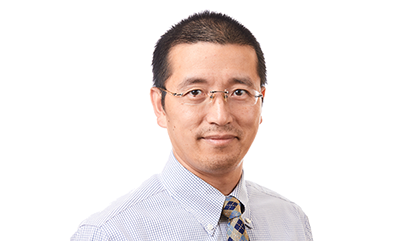Professor Leads Research on Gun Violence, Alcohol Policies.

The significant public health burdens of gun violence and alcohol misuse in the United States motivate Ziming Xuan every day as a social epidemiologist and associate professor of community health sciences at the School of Public Health.
Since joining the School of Public Health in 2010, Xuan has led local, national, and international studies to examine interventions and methodologies that reduce harms associated with these issues. Also a faculty member of the Injury Prevention Center at Boston Medical Center, Xuan analyzes the impact of health policies on substance use and related injuries among vulnerable populations, such as the physical and mental health of youth.
“There is ample literature that links acute intoxication and chronic heavy alcohol use to increased risk of severe mental health issues, particularly suicidal behaviors,” says Xuan. “When there is easy access to fatal means, such as a firearm, the risk of fatality escalates and the danger exacerbates, especially when someone is under the influence and becomes impulsive.”
Over the past 10 years, Xuan has collaborated with researchers to create and validate the Alcohol Policy Scale (APS), a novel measure that assesses and compares the alcohol policy environment of each US state and Washington, DC. In studies funded by the National Institutes of Health, the team assigned an APS score to each state, based on the efficacy and level of implementation of 29 state-level alcohol policies including alcohol taxation, retail sales restrictions, state monopoly, and outlet density regulations. Xuan found that more restrictive alcohol policy environments were strongly inversely related to adult and youth binge drinking, driving under influence, as well as alcoholic cirrhosis mortality, alcohol-related suicide and homicide, and alcohol involvement in fatal vehicle crashes.
“Our review study on alcohol policies and suicide identified policies that are effective in reducing alcohol availability—such as alcohol taxes and reducing outlet density—are associated with reduced suicide mortality,” says Xuan. “Better enforcement of restricting underage drinking is critical as well.”
Similarly, he says, firearm policies that are effective in reducing access to firearms—especially child access prevention policy—can reduce firearm related fatal injury, particularly among minors, for which suicide is one of the three leading causes of death. Xuan has worked with Michael Siegel, professor of community health sciences, and other firearm researchers to develop comprehensive, longitudinal data of state firearm policies over the last several decades and examine the impact of specific policies (such as universal background checks) in reducing gun violence by age groups, types of violence, and overall.
The societal impacts of US gun violence far outweigh the resources available for firearm violence research—which makes his collaborative work especially meaningful, Xuan says. He believes a 28th NIH Institute should be formed to advance the science of firearm research, and inform sustainable public health measures that will reduce violence and save lives.
“Our country has an intolerably high rate of gun violence, including many mass shootings, compared to other developed countries,” says Xuan. “We have to ask ourselves what we can do collectively to not let gun take away the lives of many loved ones that we care about, and the freedom that we cherish.”
“This would help address the root causes of gun violence and promote more evidence-based firearm policies to reduce gun violence,” he says.
At SPH, Xuan is the director of the health communication and promotion certificate, and this semester, he is teaching Quantitative Methods for Program Evaluation. He says he enjoys being surrounded by “students who really care about public health, understand that public health really matters, and are eager to learn and become strong public health practitioners.”
“I feel extremely fortunate to be around colleagues who are truly committed to advancing the science and advocating social changes to address current public health issues, no matter they are of urgent, chronic, life-course, or systemic nature, for the health of future generations.”